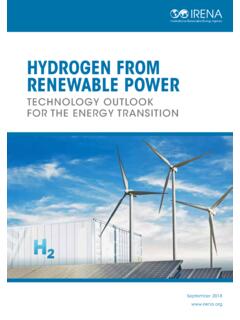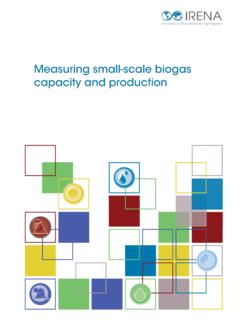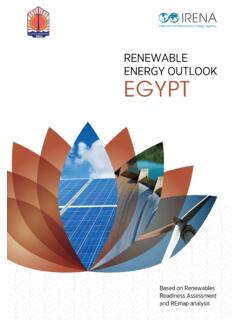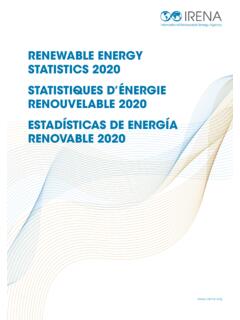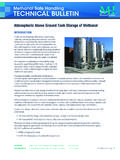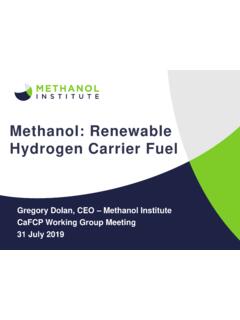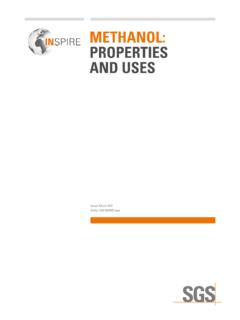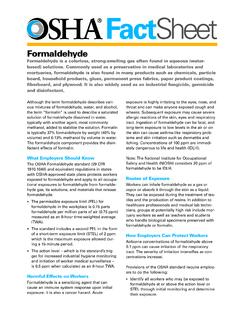Transcription of Innovation Outlook: Renewable Methanol
1 Innovation OUTLOOKRENEWABLEMETHANOL in partnership with IRENA 2021 Unless otherwise stated, material in this publication may be freely used, shared, copied, reproduced, printed and/or stored, provided that appropriate acknowledgement is given of IRENA as the source and copyright holder. Material in this publication that is attributed to third parties may be subject to separate terms of use and restrictions, and appropriate permissions from these third parties may need to be secured before any use of such material. ISBN 978-92-9260-320-5 CITATION IRENA AND Methanol institute (2021), Innovation Outlook : Renewable Methanol , International Renewable Energy Agency, Abu IRENAThe International Renewable Energy Agency (IRENA) is an intergovernmental organisation that supports countries in their transition to a sustainable energy future and serves as the principal platform for international co-operation, a centre of excellence and a repository of policy, technology, resource and financial knowledge on Renewable energy.
2 IRENA promotes the widespread adoption and sustainable use of all forms of Renewable energy, including bioenergy, geothermal, hydropower, ocean, solar and wind energy, in the pursuit of sustainable development, energy access, energy security and low-carbon economic growth and prosperity. Methanol INSTITUTEThe Methanol institute (MI) is the global trade association for the Methanol industry, representing the world s leading producers, distributors, and technology companies. Founded in 1989 in Washington DC, MI now represents its members from five offices around world in Washington DC, Beijing, Brussels, Delhi, and Singapore.
3 MI serves its members as the voice of the Methanol industry, representing companies within the membership to governments and businesses around the world to promote the sustainable growth of the industry. MI focuses on advancing the utilisation of Methanol as a clean fuel in energy-related applications such as land & marine transport, power generation, fuel cells, industrial boilers, and cook stoves. MI also supports sustainable and Renewable process to produce Methanol as a carbon-neutral chemical and fuel. AcknowledgementsThis report was jointly prepared by the International Renewable Energy Agency (IRENA) and the Methanol institute (MI).
4 It was developed under the guidance of Dolf Gielen (IRENA) and Greg Dolan (MI). The contributing authors are Seungwoo Kang and Francisco Boshell (IRENA), Alain Goeppert and Surya G. Prakash (University of Southern California), and Ingvar Land lv (Fuels & Energy Consulting) with valuable additional contributions from Paul Durrant (IRENA).The authors appreciate the technical review provided by Deger Saygin (Shura Energy Transition Center), Tue Johansson ( Moller - Maersk), Florian Ausfelder (Dechema), Alexandra Ebbinghaus (Shell), Christopher Kidder (International DME Association), Choon Fong Shih (University of Chinese Academy of Sciences), Mark Berggren (MMSA), Andrew Fenwick (Johnson Matthey), Tore Sylvester Jeppersen (Haldor Topsoe), Peter J.
5 Nieuwenhuizen (Enerkem), Acya Yalcin and Jason Chesko (Methanex).Valuable review and feedback were also provided by IRENA and MI colleagues, including Herib Bianco, Ricardo Gorini, Paul Komor, Toshimasa Masuyama, Emanuele Taibi (IRENA), and Tim Chan ( Methanol institute ). The chapters in this outlook were edited by Justin for download: For further information or to provide feedback, please contact IRENA at publication and the material herein are provided as is . All reasonable precautions have been taken by IRENA to verify the reliability of the material in this publication.
6 However, neither IRENA nor any of its officials, agents, data or other third-party content providers provides a warranty of any kind, either expressed or implied, and they accept no responsibility or liability for any consequence of use of the publication or material herein. The information contained herein does not necessarily represent the views of all Members of IRENA. The mention of specific companies or certain projects or products does not imply that they are endorsed or recommended by IRENA in preference to others of a similar nature that are not mentioned. The designations employed and the presentation of material herein do not imply the expression of any opinion on the part of IRENA concerning the legal status of any region, country, territory, city or area or of its authorities, or concerning the delimitation of frontiers or boundaries.
7 DisclaimerINNOVATION OUTLOOK: 41. Methanol : Methanol is a key product in the chemical industry. It is mainly used for producing other chemicals such as formaldehyde, acetic acid and plastics. Around 98 million tonnes (Mt) are produced per annum, nearly all of which is produced from fossil fuels (either natural gas or coal). The life-cycle emissions from current Methanol production and use are around gigatonnes (Gt) CO2 per annum (about 10% of total chemical sector emissions). Methanol production has nearly doubled in the past decade, with a large share of that growth being in China.
8 Under current trends, production could rise to 500 Mt per annum by 2050, releasing Gt CO2 per annum if solely sourced from fossil fuels. The cost of producing fossil fuel-based Methanol is in the range of USD 100-250 per tonne (t).2. Renewable Methanol : Renewable Methanol can be produced using Renewable energy and Renewable feedstocks via two routes: Bio- Methanol is produced from biomass. Key potential sustainable biomass feedstocks include: forestry and agricultural waste and by-products, biogas from landfill, sewage, municipal solid waste (MSW) and black liquor from the pulp and paper industry.
9 Green e- Methanol is obtained by using CO2 captured from Renewable sources (bioenergy with carbon capture and storage [BECCS] and direct air capture [DAC]) and green hydrogen, hydrogen produced with Renewable electricity. Less than Mt of Renewable Methanol is produced annually, mostly as bio- Methanol . The Methanol produced by either route is chemically identical to Methanol produced from fossil fuel sources. Interest in Renewable Methanol is being driven by the need to mitigate climate change by substantially reducing or eliminating CO2 emissions, and in particular by the growing focus on holding the average global temperature rise to no more than C.
10 This implies achieving net carbon neutral emissions across all sectors of the economy by mid-century. Low-emission Methanol could play a larger role in decarbonising certain sectors where options are currently limited particularly as a feedstock in the chemical industry or as a fuel in road or marine transport. 3. Production costs of bio- Methanol : Since production is currently low, limited data are available on actual costs, meaning that potential costs need to be estimated. The bio- Methanol production cost will depend on the bio-feedstock cost, investment cost and the efficiency of the conversion processes.


